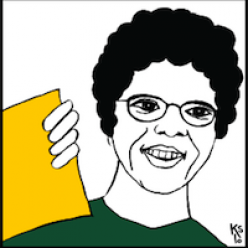- War Crimes and Victims: Feminist and Critical Perspectives. CRIM417. School of Criminology, Simon Fraser University.
Course description: This course will draw on a critical and feminist framework for the study of international instruments such as the U.N. Convention on Genocide, and the International Criminal Court. Contemporary cases will be presented, examined and discussed. The conceptual framework will be used to identify when and where a war crime occurs, who the victims are, and what possibilities there are for justice in each case. The course emphasizes the insights and experiences of the victims in their search for truth and justice. Crimes studied during this course will include, but are not limited to, war rape, sexual slavery, genocide, ethnic cleansing, and forced disappearances. Geographic cases studied will include, but are not limited to, Rwanda, Guatemala, Bosnia-Herzegovina, and South Africa. The course is divided in three parts. The first part will articulate a framework for the analysis of war crimes and their victims. The second part will review contemporary cases. The final part will review models of justice that can lead to reconciliation in war-torn societies. Weekly readings are the basis for seminar discussions and students are expected to fully participate in class.
- Qualitative Research Methods in Criminology. CRIM321. School of Criminology, Simon Fraser University.
You arrive to CRIM 321 with a solid base of both quantitative and qualitative research methods in criminology. This course is aimed at students who want a better understanding and basic experience on doing qualitative research. The aim is to learn tools and issues involved in collecting and analyzing small-scale qualitative data. In this course you will design a research methodology in accordance with ethical considerations proper to criminology and other social sciences.
- Social Movements and Their Critics. SA321. Department of Sociology and Anthropology, Simon Fraser University.
Description: Social movements may be responsible for most social change in our societies. But these organizations are also susceptible to the influence of politics, geography, culture, and even the new communication technologies. Theories and research methodologies with which we try to seize the phenomena of social movement have to account for what seems to a new generation of movements with apparently new discourses and issues. The course will try to understand what is going on in today’s news headlines: What is new about social movements? What makes a movement successful? How are they organized and how big they are? Where are they?Is there a connection between terrorism/crime and social activism? Which research methodology may be applied to this field? The course will illustrate foundational theories with an array of cases from Canada and beyond. Course lectures will be supplemented with course discussion of a selection of readings, videos, news-clips, and internet sites
- Truth and Reconciliation: The Politics of Memory. A Comparative Examination of cases in Guatemala and Canada. Co-taught with Lorena Sekwan. The Interfaith Institute for Peace, Justice & Social Movements, Summer Session. The Institute of the Humanities, Simon Fraser University.
Visit my Academia.edu page to view course syllabi for all these courses.
